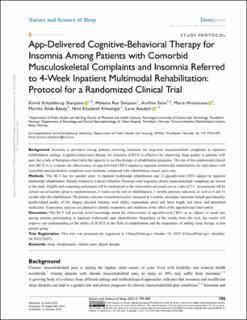| dc.contributor.author | Skarpsno, Eivind Schjelderup | |
| dc.contributor.author | Simpson, Melanie Rae | |
| dc.contributor.author | Seim, Arnfinn | |
| dc.contributor.author | Hrozanova, Maria | |
| dc.contributor.author | Bakøy, Marthe Alida | |
| dc.contributor.author | Klevanger, Nina Elisabeth | |
| dc.contributor.author | Aasdahl, Lene | |
| dc.date.accessioned | 2023-10-31T07:34:23Z | |
| dc.date.available | 2023-10-31T07:34:23Z | |
| dc.date.created | 2023-10-29T22:20:59Z | |
| dc.date.issued | 2023 | |
| dc.identifier.issn | 1179-1608 | |
| dc.identifier.uri | https://hdl.handle.net/11250/3099565 | |
| dc.description.abstract | Background: Insomnia is prevalent among patients receiving treatment for long-term musculoskeletal complaints in inpatient rehabilitation settings. Cognitive-behavioral therapy for insomnia (CBT-I) is effective for improving sleep quality in patients with pain, but a lack of therapists often limits the capacity to use this therapy in rehabilitation programs. The aim of this randomized clinical trial (RCT) is to evaluate the effectiveness of app-delivered CBT-I adjunct to inpatient multimodal rehabilitation for individuals with comorbid musculoskeletal complaints and insomnia, compared with rehabilitation (usual care) only.
Methods: This RCT has two parallel arms: 1) inpatient multimodal rehabilitation and 2) app-delivered CBT-I adjunct to inpatient multimodal rehabilitation. Patients referred to Unicare Helsefort (Norway) with long-term chronic musculoskeletal complaints are invited to the study. Eligible and consenting participants will be randomized to the intervention and usual care at a ratio of 2:1. Assessments will be carried out at baseline (prior to randomization), 6 weeks (at the end of rehabilitation), 3 months (primary outcome), as well as 6 and 12 months after the rehabilitation. The primary outcome is insomnia severity measured at 3 months. Secondary outcomes include pain intensity, health-related quality of life, fatigue, physical function, work ability, expectations about sick leave length, sick leave, and prescribed medication. Exploratory analyses are planned to identify moderators and mediators of the effect of the app-delivered intervention.
Discussion: This RCT will provide novel knowledge about the effectiveness of app-delivered CBT-I as an adjunct to usual care among patients participating in inpatient multimodal pain rehabilitation. Regardless of the results from this trial, the results will improve our understanding of the utility of dCBT-I in the field of rehabilitation and the importance of adding sleep therapy to this patient group. | en_US |
| dc.language.iso | eng | en_US |
| dc.publisher | Dove Press Ltd | en_US |
| dc.rights | Navngivelse-Ikkekommersiell 4.0 Internasjonal | * |
| dc.rights.uri | http://creativecommons.org/licenses/by-nc/4.0/deed.no | * |
| dc.title | App-Delivered Cognitive-Behavioral Therapy for Insomnia Among Patients with Comorbid Musculoskeletal Complaints and Insomnia Referred to 4-Week Inpatient Multimodal Rehabilitation: Protocol for a Randomized Clinical Trial | en_US |
| dc.title.alternative | App-Delivered Cognitive-Behavioral Therapy for Insomnia Among Patients with Comorbid Musculoskeletal Complaints and Insomnia Referred to 4-Week Inpatient Multimodal Rehabilitation: Protocol for a Randomized Clinical Trial | en_US |
| dc.type | Peer reviewed | en_US |
| dc.type | Journal article | en_US |
| dc.description.version | publishedVersion | en_US |
| dc.source.journal | Nature and Science of Sleep | en_US |
| dc.identifier.doi | 10.2147/NSS.S419520 | |
| dc.identifier.cristin | 2189688 | |
| cristin.ispublished | true | |
| cristin.fulltext | original | |
| cristin.qualitycode | 1 | |

